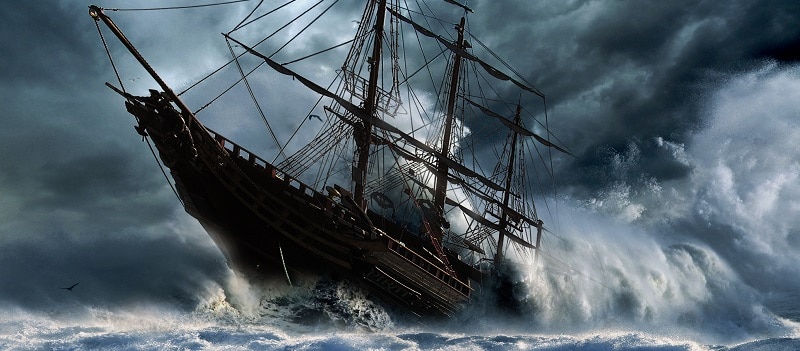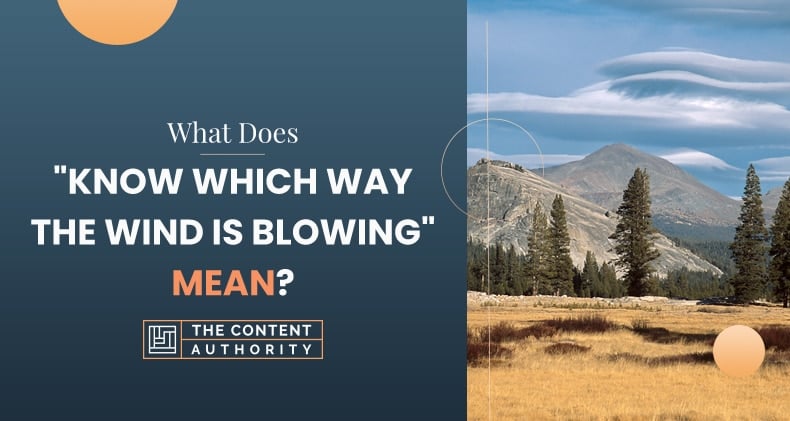Have you ever heard the phrase, do you “know which way the wind is blowing?” Has this phrase confused you? Maybe this is because you’ve taken the phrase at its literal meaning which isn’t how it’s meant to be taken.
The phrase, “know which way the wind is blowing” isn’t meant to be taken literally. It’s not asking where the wind is coming from. Instead, it’s meant to be taken figuratively. As such, it is used to mean you’re able to anticipate how a situation will likely develop or what the outcome will be.
Meaning of the Phrase
“Know which way the wind blows” is a phrase that can be said in many different ways, including:
- The way the wind blows
- The way the wind is blowing
- Which way the wind blows
Regardless of which way you say it, the phrase will always mean the same thing. It means that you understand what’s happening even though the circumstances are changing. In this regard, the person who’s using this phrase is saying that they’re able to anticipate what will happen in the future (e.g. how a certain course or situation will develop). This is because before taking any other action they’ve made the effort to try to discover information regarding a situation, especially when it comes to other people’s opinions.
There are a lot of other idioms that are also similar to “know which way the wind is blowing.” Some of the ones you may be familiar with include:
- Get wind of
- The best of both worlds
- No pain no gain
- On thin ice
- Throw caution to the wind
- Twisting in the wind
- Sail close to the wind
- Pull yourself together
- Break the ice
- Seven sheets to the wind
Origin of the Phrase
Proverbs referencing the wind are ancient, dating as far back as 700 years. In some cases, the wind is used to refer to how popular opinion or another prevailing force is going to unfold. According to the Oxford Dictionary of English Proverbs, some of the other well-known proverbs that have to do with wind include:
- To sail with the wind and tide (1546)
- The wind keeps not always in one quarter (1579)
- The wind in one’s face makes one wise (1640)
- As the wind blows, you must set your sail (1846)

The one thing that all these proverbs have in common has to do with the characteristics of the wind: It can blow things in its direction (e.g. flags, a boat’s sails). This is why the wind’s direction has come to be used when discussing determining the direction of people’s lives or what influences their decisions. For instance, “which way the wind is blowing” is used when referring to the way certain events are unfolding. A good way to explain this is to offer up the following example: Imagine that you’re running for public office. As a candidate, you have to take a position that is acceptable to people’s wishes (the direction of the wind) if you want to be successful.
Understanding the literal sense of this phrase is important if you want to understand that in the figurative sense it’s used to mean the tide of public opinion. This is something that we know dates back to the early 19th century. However, like with other idioms and proverbs, we don’t have a clear idea of where it originated from.
Historically, “which way the wind is blowing” is something that’s always been important in a physical or literal sense. This is because farmers and sailors needed this information in order to practice their trade. For this reason, many people believe that this phrase has naturally evolved throughout the course of time as it was used in numerous situations when it really was important to know the wind’s direction. Of course, today this phrase is far more commonly used regarding various circumstances but especially in regard to public opinion.
While many people do believe that this phrase was used prior to the 19th century, its first written record is found in The Times in 1819. At this time there was an advertisement for the book “The Political House that Jack Built” in which there’s a passage that reads, “A straw – thrown up to show which way the wind blows.”
We also have this phrase being used in popular culture when Bob Dylan wrote the song “Subterranean Homesick Blues” in 1965. In this song, there’s a phrase that says “You don’t need a weatherman to know which way the wind blows.” This phrase alludes to both metaphorical and literal interpretations. It suggests that you don’t need someone to tell you what’s happening in the world around you. Instead, you should make your own decisions.
“Which way the wind blows” was at the very least popularized by the American singer-songwriter, author, and visual artist Bob Dylan who was born Robert Allen Zimmerman on May 24, 1941. This shouldn’t come as a surprise though since Bob Dylan is regarded as one of the world’s greatest songwriters. As such he’s been a major figure in popular culture for over 50 years. He also wrote many anthems for the civil rights and anti-war movements during his time. In doing so he used many literal phrases to share a figurative meaning. One such song with which he did this was “Subterranean Homesick Blues.”

“Subterranean Homesick Blues” was recorded on January 14, 1965. Dylan then released it as a single on Columbia Records on March 8, 1965. Not only did this song become Dylan’s first Top 40 hit in the United States but it was also used in D. A. Pennebaker’s documentary “Don’t Look Back.” The popularity behind this song and its phrase “You don’t need a weatherman to know which way the wind blows” is just one of the many examples of how Dylan would take a literal phrase and give it a figurative meaning. In this case, he also helped to popularize the phrase, “which way the wind is blowing.”
There is also a proverb that’s closely related to this phrase that has originated at some time over the years. The proverb says, “you don’t need a weatherman to know which way the wind blows” which means “You don’t need an expert to tell you what you already know.”
When to Use This Phrase
With how popular this phrase is, you may like to know that it’s possible to use it in a variety of situations. It’s even common in everyday conversations now. For instance, if someone were to ask another person if they’re going to take a certain course of action the other person may tell them that they’re going to wait and see “which way the wind blows.” This would imply that they aren’t quite ready to make a decision. They want to see what other people are doing before they make their minds up. While this may not be the preferred choice, it could be seen as correct since it’d be in line with their peers – something they could use to their advantage.

Politicians are oftentimes quoted as saying this as well. For instance, they may say that they’re not going to publish a statement until they “know which way the wind blows.” In other words, they want to align themselves with public opinion first.
Example Sentences
While the origin of the phrase “which way the wind is blowing” is somewhat unknown, the popularity of this phrase can’t be denied. With its popularity in mind, you may want to use it in some of your writing or conversations. Here are a few examples of sentences to help you get started with doing so:
- When it comes to public opinion regarding this issue, you can bet that these politicians not only know which way the wind blows but they’ll act accordingly.
- Before I decide which way I’ll vote I’m going to see which way the wind is blowing.
- I’m not sure what I want to do about it yet. I think I’ll wait to see which way the wind is blowing before I make up my mind.
- Unfortunately, until we see which way the wind blows, there’s nothing more we can do.
- I think that if we wait to see which way the wind blows we’ll have a better idea of what’s happening.
- She said that she was going to wait to see which way the wind blows instead of making a rash decision.
- Before we make a decision I think we should talk to him and see which way the wind blows.
- You don’t need to look back at history to know which way the wind blows.
- He’s known for not making pronouncements until he sees which way the wind blows.
Conclusion
Whether it was Bob Dylan or someone else that brought the phrase “which way the wind is blowing” into today’s popular vernacular we may never know. One thing is for certain though, this phrase means that you’re joining up with something or someone because it’s popular.
Shawn Manaher is the founder and CEO of The Content Authority. He’s one part content manager, one part writing ninja organizer, and two parts leader of top content creators. You don’t even want to know what he calls pancakes.

